【精编范文】老外交官谈英语演讲之道公众演讲范文[1]-范文模板 (3页)
【推荐】老外交官谈英语演讲之道(word格式) (2页)

本文部分内容来自网络,本司不为其真实性负责,如有异议请及时联系,本司将予以删除== 本文为word格式,下载后可编辑修改,推荐下载使用!==老外交官谈英语演讲之道老外交官谈英语演讲之道[dvnews_page]段津简介:段津先生1953年毕业于北京外国语学院,被派往朝鲜开城中国人民志愿军停战谈判代表团任翻译,属于新中国第一代英语翻译。
曾为陈毅、邓小平、李先念、郭沫若等老一代国家领导人会见外宾时当翻译,先后担任中国驻加拿大大使馆新闻参赞、中国驻温哥华总领事、外交部新闻司副司长兼外交部发言人、中国驻澳大利亚悉尼总领事、中国人民外交学会副会长。
在长年的外交工作中,段津先生积累了丰富的英语口译、笔译经验,擅长用英语演讲,著有《如何用英语作精彩演讲》一书(世界知识出版社出版)。
段津对英语演讲的总体认识:演讲艺术:中西方差距明显我们的社会政治情况与国外不太一样。
美国人从小学开始就要竞选这个、竞选那个,比如俱乐部经理、学生会主席,跟政治竞选差不多,所以他们的讲演发达,在讲演培训方面也开展得比较好。
在西方国家,特别是英语国家更加重视演讲。
中国在这方面滞后了一点儿,但是现在讲演的风气开始兴盛,这很是令人喜悦。
随着我们对外经贸、外交关系的拓展,学英语讲英语的形势更加喜人。
我去年跟一批中学生专门进行英语讲演讲座,他们怀着很大的兴趣听我讲。
对外经贸大学也曾经请我去讲过怎么样对外国人进行沟通。
最近华北地区的大学生讲演比赛,我去当了裁判。
英文演讲和中文演讲相比有哪些区别?段津:实际上一样,关键在于了解演讲对象,减少冗余信息。
中文演讲和英文演讲实际上是一样的,关键是看你演讲的对象。
不管是用中文还是用英文演讲,首先你要对自己的听众要有一个很好的了解。
在国外讲演,讲演超过半个小时,你就要考虑这个时间是不是快到了,绝不要超过50分钟。
而且应该留出一半以上的时间让听众来提问题。
在中国情况就有所不同,因为过去的习惯,有的时候往往邀请方要求我讲三个小时。
外交会议发言稿范文英文
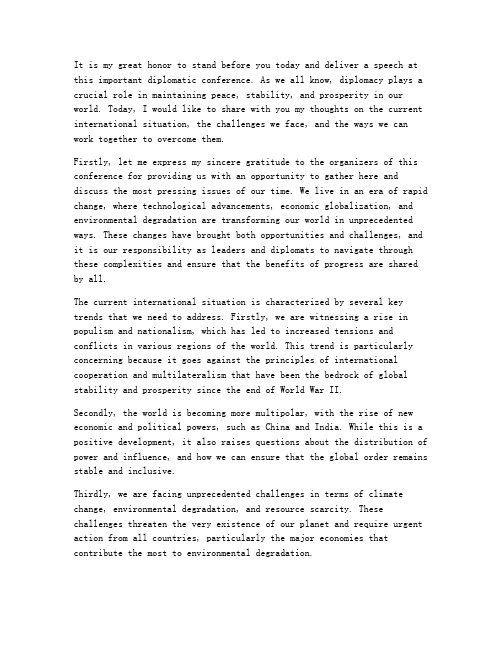
It is my great honor to stand before you today and deliver a speech at this important diplomatic conference. As we all know, diplomacy plays a crucial role in maintaining peace, stability, and prosperity in our world. Today, I would like to share with you my thoughts on the current international situation, the challenges we face, and the ways we can work together to overcome them.Firstly, let me express my sincere gratitude to the organizers of this conference for providing us with an opportunity to gather here and discuss the most pressing issues of our time. We live in an era of rapid change, where technological advancements, economic globalization, and environmental degradation are transforming our world in unprecedented ways. These changes have brought both opportunities and challenges, and it is our responsibility as leaders and diplomats to navigate through these complexities and ensure that the benefits of progress are shared by all.The current international situation is characterized by several key trends that we need to address. Firstly, we are witnessing a rise in populism and nationalism, which has led to increased tensions and conflicts in various regions of the world. This trend is particularly concerning because it goes against the principles of international cooperation and multilateralism that have been the bedrock of global stability and prosperity since the end of World War II.Secondly, the world is becoming more multipolar, with the rise of new economic and political powers, such as China and India. While this is a positive development, it also raises questions about the distribution of power and influence, and how we can ensure that the global order remains stable and inclusive.Thirdly, we are facing unprecedented challenges in terms of climate change, environmental degradation, and resource scarcity. These challenges threaten the very existence of our planet and require urgent action from all countries, particularly the major economies that contribute the most to environmental degradation.In light of these challenges, I believe that there are several key areas where we can work together to promote peace, stability, and prosperity in our world:1. Strengthening multilateralism: Multilateralism is the cornerstone of the international order, and we must work together to strengthen it. This means respecting the rules-based international system, upholding the principles of sovereignty and territorial integrity, and promoting dialogue and cooperation among all countries.2. Addressing the root causes of conflict: Many conflicts in the world are rooted in issues such as poverty, inequality, and lack of access to education and healthcare. We must work together to address these root causes and promote sustainable development in all regions of the world.3. Promoting inclusive growth: Economic globalization has brought immense benefits, but it has also created winners and losers. We must work together to ensure that the benefits of economic growth are shared by all, particularly the most vulnerable groups in society.4. Combating climate change: Climate change is a global crisis that requires urgent action from all countries. We must work together to implement the Paris Agreement and take concrete steps to reduce greenhouse gas emissions and adapt to the impacts of climate change.5. Promoting peace and security: Conflicts and tensions in various regions of the world threaten global stability and security. We must work together to promote peace and security through dialogue, negotiation, and the rule of law.In conclusion, the challenges we face are complex and multifaceted, but they are not insurmountable. By working together, we can overcome these challenges and build a more peaceful, stable, and prosperous world for future generations.Let me conclude my speech by reiterating the importance of diplomacy in addressing these challenges. Diplomacy is not just about the formal diplomatic processes, but also about building trust, fostering dialogue, and promoting understanding among all stakeholders. It is throughdiplomacy that we can bridge the gaps between different cultures, ideologies, and interests, and find common ground for cooperation.Ladies and gentlemen, the future of our world depends on our collective efforts and commitment to peace, stability, and prosperity. Let us work together, with determination and courage, to build a better future for all.Thank you.。
老外交官谈英语演讲之道(精选多篇)
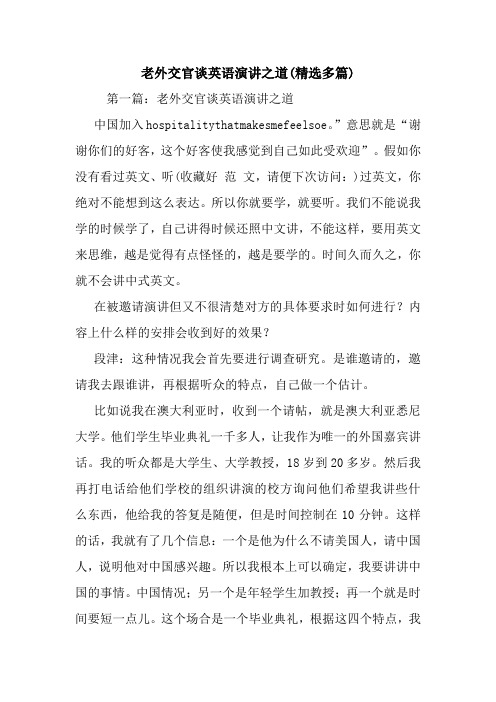
老外交官谈英语演讲之道(精选多篇)第一篇:老外交官谈英语演讲之道中国加入hospitalitythatmakesmefeelsoe。
”意思就是“谢谢你们的好客,这个好客使我感觉到自己如此受欢迎”。
假如你没有看过英文、听(收藏好范文,请便下次访问:)过英文,你绝对不能想到这么表达。
所以你就要学,就要听。
我们不能说我学的时候学了,自己讲得时候还照中文讲,不能这样,要用英文来思维,越是觉得有点怪怪的,越是要学的。
时间久而久之,你就不会讲中式英文。
在被邀请演讲但又不很清楚对方的具体要求时如何进行?内容上什么样的安排会收到好的效果?段津:这种情况我会首先要进行调查研究。
是谁邀请的,邀请我去跟谁讲,再根据听众的特点,自己做一个估计。
比如说我在澳大利亚时,收到一个请帖,就是澳大利亚悉尼大学。
他们学生毕业典礼一千多人,让我作为唯一的外国嘉宾讲话。
我的听众都是大学生、大学教授,18岁到20多岁。
然后我再打电话给他们学校的组织讲演的校方询问他们希望我讲些什么东西,他给我的答复是随便,但是时间控制在10分钟。
这样的话,我就有了几个信息:一个是他为什么不请美国人,请中国人,说明他对中国感兴趣。
所以我根本上可以确定,我要讲讲中国的事情。
中国情况;另一个是年轻学生加教授;再一个就是时间要短一点儿。
这个场合是一个毕业典礼,根据这四个特点,我就准备出了一个讲稿。
具体进行的过程大概是这样的。
我记得有一个英国作家讲过,你可以试一下谈别人,比如说你跟人家谈话时,你讲他的事情,他听两个小时都不腻,所以既要讲自己,也要讲别人。
根据这样一个原则,我就在这个讲稿里头采取一种对比的办法。
我一上来就是澳大利亚和中国差别很大,共同点也很多,夏天我们都出汗,冬天我们都会冻得发抖,你吃饭用刀叉,我吃饭用筷子。
比如说我们中国看问题是大中小,写地址是先写国名,再写省,再写城市,再写街道,再写门牌号,然后再写姓,然后写名。
外国人先写名,再写姓,你的门牌号码、楼的号码、马路、城市、省份,最后是国家。
老外交官谈英语演讲之道公众演讲范文(最新篇)
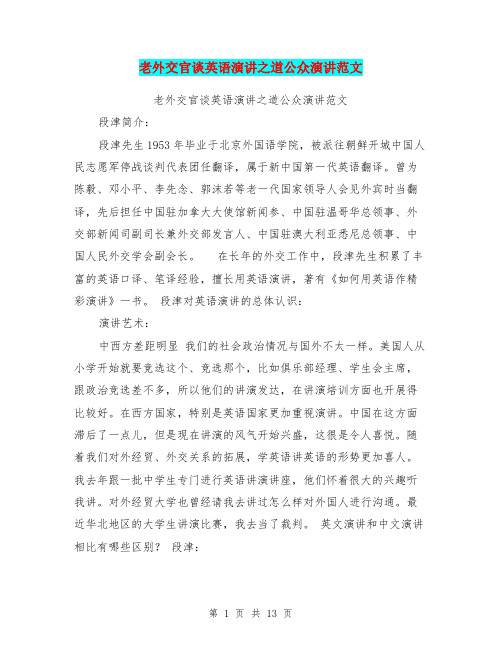
老外交官谈英语演讲之道公众演讲范文老外交官谈英语演讲之道公众演讲范文段津简介:段津先生1953年毕业于北京外国语学院,被派往朝鲜开城中国人民志愿军停战谈判代表团任翻译,属于新中国第一代英语翻译。
曾为陈毅、邓小平、李先念、郭沫若等老一代国家领导人会见外宾时当翻译,先后担任中国驻加拿大大使馆新闻参、中国驻温哥华总领事、外交部新闻司副司长兼外交部发言人、中国驻澳大利亚悉尼总领事、中国人民外交学会副会长。
在长年的外交工作中,段津先生积累了丰富的英语口译、笔译经验,擅长用英语演讲,著有《如何用英语作精彩演讲》一书。
段津对英语演讲的总体认识:演讲艺术:中西方差距明显我们的社会政治情况与国外不太一样。
美国人从小学开始就要竞选这个、竞选那个,比如俱乐部经理、学生会主席,跟政治竞选差不多,所以他们的讲演发达,在讲演培训方面也开展得比较好。
在西方国家,特别是英语国家更加重视演讲。
中国在这方面滞后了一点儿,但是现在讲演的风气开始兴盛,这很是令人喜悦。
随着我们对外经贸、外交关系的拓展,学英语讲英语的形势更加喜人。
我去年跟一批中学生专门进行英语讲演讲座,他们怀着很大的兴趣听我讲。
对外经贸大学也曾经请我去讲过怎么样对外国人进行沟通。
最近华北地区的大学生讲演比赛,我去当了裁判。
英文演讲和中文演讲相比有哪些区别?段津:实际上一样,关键在于了解演讲对象,减少冗余信息。
中文演讲和英文演讲实际上是一样的,关键是看你演讲的对象。
不管是用中文还是用英文演讲,首先你要对自己的听众要有一个很好的了解。
在国外讲演,讲演超过半个小时,你就要考虑这个时间是不是快到了,绝不要超过50分钟。
而且应该留出一半以上的时间让听众来提问题。
在中国情况就有所不同,因为过去的习惯,有的时候往往邀请方要求我讲三个小时。
实际上现在中国人也愿意听短话,特别是没有什么信息量的套话说法,我们的演讲如何运用语言魅力打动听众?适应听众思维习惯?段津:在讲演当中,语言文字的运用很重要。
外交官全英文演讲稿范文
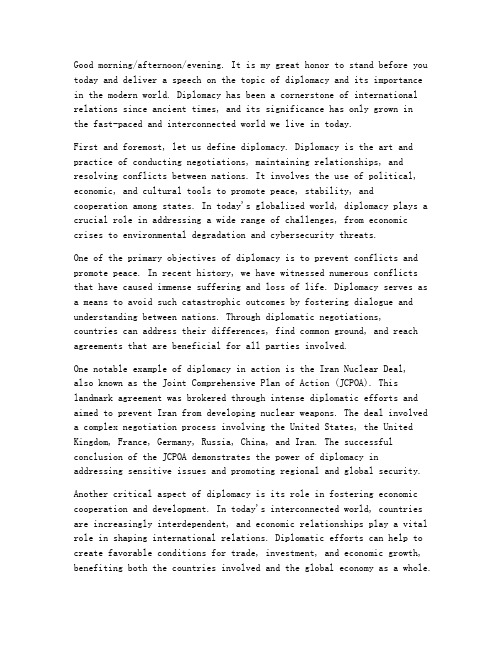
Good morning/afternoon/evening. It is my great honor to stand before you today and deliver a speech on the topic of diplomacy and its importance in the modern world. Diplomacy has been a cornerstone of international relations since ancient times, and its significance has only grown in the fast-paced and interconnected world we live in today.First and foremost, let us define diplomacy. Diplomacy is the art and practice of conducting negotiations, maintaining relationships, and resolving conflicts between nations. It involves the use of political, economic, and cultural tools to promote peace, stability, and cooperation among states. In today's globalized world, diplomacy plays a crucial role in addressing a wide range of challenges, from economic crises to environmental degradation and cybersecurity threats.One of the primary objectives of diplomacy is to prevent conflicts and promote peace. In recent history, we have witnessed numerous conflicts that have caused immense suffering and loss of life. Diplomacy serves as a means to avoid such catastrophic outcomes by fostering dialogue and understanding between nations. Through diplomatic negotiations, countries can address their differences, find common ground, and reach agreements that are beneficial for all parties involved.One notable example of diplomacy in action is the Iran Nuclear Deal, also known as the Joint Comprehensive Plan of Action (JCPOA). This landmark agreement was brokered through intense diplomatic efforts and aimed to prevent Iran from developing nuclear weapons. The deal involved a complex negotiation process involving the United States, the United Kingdom, France, Germany, Russia, China, and Iran. The successful conclusion of the JCPOA demonstrates the power of diplomacy in addressing sensitive issues and promoting regional and global security.Another critical aspect of diplomacy is its role in fostering economic cooperation and development. In today's interconnected world, countries are increasingly interdependent, and economic relationships play a vital role in shaping international relations. Diplomatic efforts can help to create favorable conditions for trade, investment, and economic growth, benefiting both the countries involved and the global economy as a whole.For instance, the World Trade Organization (WTO) is an international organization that aims to promote free trade and reduce trade barriers among its member states. Through diplomatic negotiations and dispute resolution mechanisms, the WTO helps to ensure a level playing field for businesses and fosters economic stability and growth. Additionally, diplomatic initiatives such as the Paris Agreement on climate change demonstrate the potential of diplomacy to address global challenges and achieve collective goals.Furthermore, diplomacy plays a crucial role in promoting cultural exchange and understanding. Cultural diplomacy involves the use of arts, sports, education, and tourism to foster positive relations between nations. Through cultural exchange programs, people from different countries can learn about each other's traditions, values, and perspectives, which can help to build mutual respect and cooperation.One example of cultural diplomacy is the Confucius Institutes, which are non-profit educational institutions established to promote Chinese language and culture. These institutes have been instrumental in fostering people-to-people exchanges and enhancing mutual understanding between China and other countries.In conclusion, diplomacy is an essential tool for addressing the challenges of the modern world. It serves as a means to prevent conflicts, promote peace, foster economic cooperation, and facilitate cultural exchange. As we navigate an increasingly complex and interconnected world, the importance of diplomacy cannot be overstated.However, diplomacy is not without its challenges. The world is characterized by diverse interests, ideologies, and power dynamics, which can make negotiations and agreements difficult to achieve. In order to be effective, diplomacy requires patience, perseverance, and a willingness to compromise.As diplomats, we must always remain committed to the principles of diplomacy, including respect for sovereignty, non-interference in internal affairs, and the pursuit of mutual benefits. We must also beadaptable and innovative, as the nature of international relations is constantly evolving.In conclusion, diplomacy is a powerful instrument for building a more peaceful, stable, and prosperous world. By working together, we can overcome the challenges that lie ahead and create a future that is brighter for all. Thank you.。
中国外交官英文发言稿作文

中国外交官英文发言稿作文英文:Good afternoon, everyone. It is my pleasure to be here today to discuss China's foreign policy. As a diplomat, I believe that it is important to maintain open communication and dialogue with other countries in order to promote mutual understanding and cooperation.One of the key principles of China's foreign policy is the idea of peaceful coexistence. This means that we believe in respecting the sovereignty of other nations and working together to resolve conflicts through peaceful means. We also believe in the importance of non-interference in the internal affairs of other countries.Another important aspect of our foreign policy is the promotion of economic cooperation and development. China has become a major player in the global economy, and we believe in working with other countries to promote trade,investment, and economic growth. We also believe in the importance of cultural exchange and people-to-people diplomacy in promoting understanding and friendship between nations.中文:大家下午好。
外交官式演讲稿范文英文
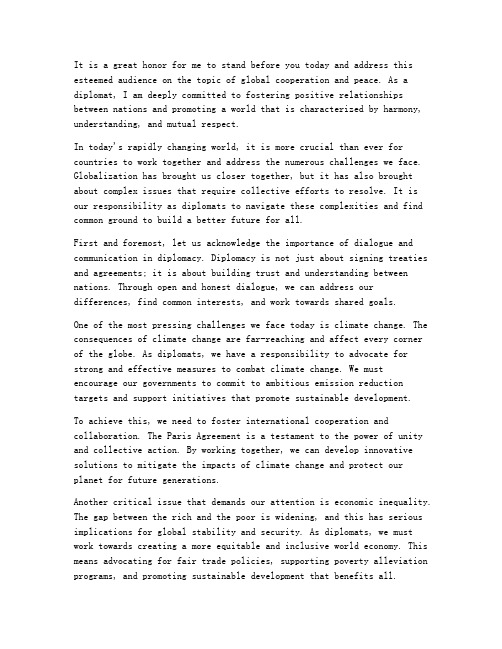
It is a great honor for me to stand before you today and address this esteemed audience on the topic of global cooperation and peace. As a diplomat, I am deeply committed to fostering positive relationships between nations and promoting a world that is characterized by harmony, understanding, and mutual respect.In today's rapidly changing world, it is more crucial than ever for countries to work together and address the numerous challenges we face. Globalization has brought us closer together, but it has also brought about complex issues that require collective efforts to resolve. It is our responsibility as diplomats to navigate these complexities and find common ground to build a better future for all.First and foremost, let us acknowledge the importance of dialogue and communication in diplomacy. Diplomacy is not just about signing treaties and agreements; it is about building trust and understanding between nations. Through open and honest dialogue, we can address our differences, find common interests, and work towards shared goals.One of the most pressing challenges we face today is climate change. The consequences of climate change are far-reaching and affect every corner of the globe. As diplomats, we have a responsibility to advocate for strong and effective measures to combat climate change. We must encourage our governments to commit to ambitious emission reduction targets and support initiatives that promote sustainable development.To achieve this, we need to foster international cooperation and collaboration. The Paris Agreement is a testament to the power of unity and collective action. By working together, we can develop innovative solutions to mitigate the impacts of climate change and protect our planet for future generations.Another critical issue that demands our attention is economic inequality. The gap between the rich and the poor is widening, and this has serious implications for global stability and security. As diplomats, we must work towards creating a more equitable and inclusive world economy. This means advocating for fair trade policies, supporting poverty alleviation programs, and promoting sustainable development that benefits all.Furthermore, we must address the issue of conflict and insecurity. Wars and conflicts have a devastating impact on societies, economies, and human lives. As diplomats, our role is to prevent conflicts and seek peaceful resolutions. This requires us to engage in proactive diplomacy, build strong relationships with all stakeholders, and work towards reconciliation and peacebuilding.In this context, it is essential to promote multilateralism and the rules-based international order. The United Nations and its various agencies play a crucial role in facilitating global cooperation and addressing pressing issues. As diplomats, we must support and strengthen these institutions to ensure they can effectively fulfill their mandates.In addition, we must invest in education and empower young people to become agents of change. Education is a powerful tool for fostering understanding, tolerance, and empathy. By investing in education, we can equip future generations with the knowledge and skills needed to build a more peaceful and prosperous world.Ladies and gentlemen,In conclusion, diplomacy is a noble profession that requires dedication, commitment, and perseverance. As diplomats, we have a unique opportunity to shape the future of our world. By working together, we can overcome the challenges that confront us and create a better future for all.Let us embrace the principles of diplomacy and promote global cooperation, peace, and understanding. Let us be the architects of a world that is characterized by unity, compassion, and progress.Thank you.。
中国外交官英文发言稿作文
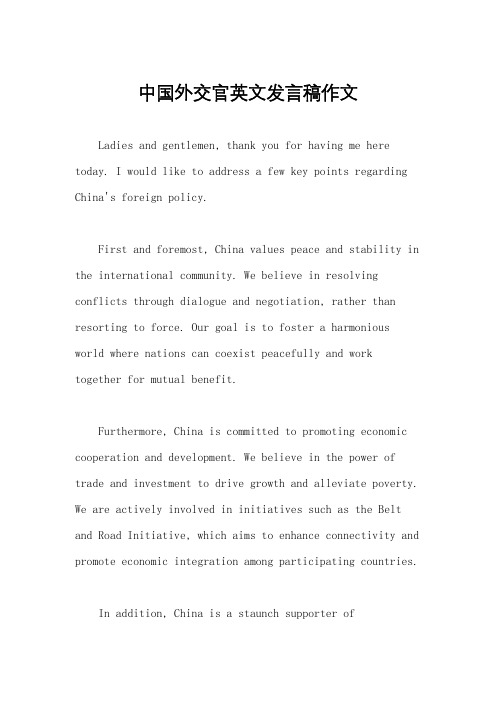
中国外交官英文发言稿作文Ladies and gentlemen, thank you for having me here today. I would like to address a few key points regarding China's foreign policy.First and foremost, China values peace and stability in the international community. We believe in resolving conflicts through dialogue and negotiation, rather than resorting to force. Our goal is to foster a harmonious world where nations can coexist peacefully and work together for mutual benefit.Furthermore, China is committed to promoting economic cooperation and development. We believe in the power of trade and investment to drive growth and alleviate poverty. We are actively involved in initiatives such as the Belt and Road Initiative, which aims to enhance connectivity and promote economic integration among participating countries.In addition, China is a staunch supporter ofmultilateralism. We believe that global challenges require collective action and cooperation. We actively participate in international organizations such as the United Nations and the World Trade Organization, and we advocate for afair and inclusive international order that respects the sovereignty and interests of all nations.Moreover, China is dedicated to addressing global issues such as climate change and sustainable development. We recognize the importance of protecting the environment for future generations and have taken significant steps to reduce carbon emissions and promote renewable energy. We are also committed to achieving the United Nations Sustainable Development Goals and actively contribute to international efforts in this regard.Lastly, China values cultural exchange and people-to-people diplomacy. We believe that understanding and respect between different cultures and civilizations are crucialfor building lasting friendships and promoting peace. We encourage cultural exchanges, educational programs, and tourism to foster mutual understanding and appreciationamong people from different countries.In conclusion, China's foreign policy is guided by principles of peace, cooperation, and mutual respect. Weare committed to working with the international communityto address global challenges and promote common development. Thank you.。
外交部培训发言稿英文(3篇)
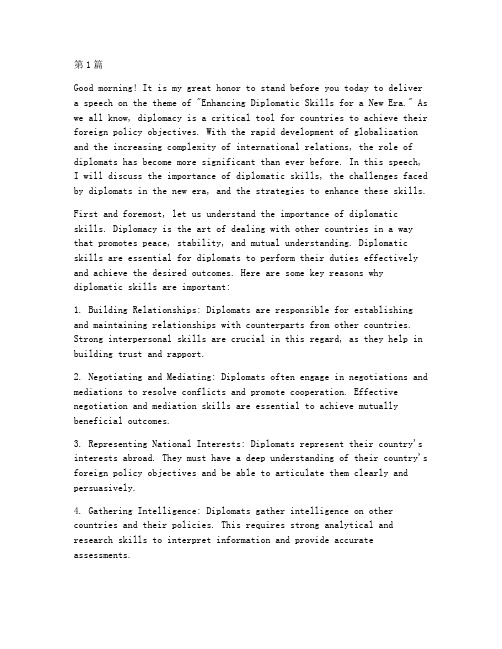
第1篇Good morning! It is my great honor to stand before you today to deliver a speech on the theme of "Enhancing Diplomatic Skills for a New Era." As we all know, diplomacy is a critical tool for countries to achieve their foreign policy objectives. With the rapid development of globalization and the increasing complexity of international relations, the role of diplomats has become more significant than ever before. In this speech, I will discuss the importance of diplomatic skills, the challenges faced by diplomats in the new era, and the strategies to enhance these skills.First and foremost, let us understand the importance of diplomatic skills. Diplomacy is the art of dealing with other countries in a way that promotes peace, stability, and mutual understanding. Diplomatic skills are essential for diplomats to perform their duties effectively and achieve the desired outcomes. Here are some key reasons why diplomatic skills are important:1. Building Relationships: Diplomats are responsible for establishing and maintaining relationships with counterparts from other countries. Strong interpersonal skills are crucial in this regard, as they help in building trust and rapport.2. Negotiating and Mediating: Diplomats often engage in negotiations and mediations to resolve conflicts and promote cooperation. Effective negotiation and mediation skills are essential to achieve mutually beneficial outcomes.3. Representing National Interests: Diplomats represent their country's interests abroad. They must have a deep understanding of their country's foreign policy objectives and be able to articulate them clearly and persuasively.4. Gathering Intelligence: Diplomats gather intelligence on other countries and their policies. This requires strong analytical and research skills to interpret information and provide accurate assessments.5. Adapting to Change: The international landscape is constantly evolving, and diplomats must be able to adapt to new challenges and opportunities. This requires flexibility, resilience, and a willingness to learn.Now, let us explore the challenges faced by diplomats in the new era. The world today is more interconnected and complex than ever before. Some of the key challenges include:1. Cybersecurity: The digital age has brought new challenges in terms of cybersecurity. Diplomats must be equipped to deal with cyber threats and ensure the security of their country's digital assets.2. Disinformation: The spread of disinformation and fake news has becomea significant challenge for diplomats. They must be able to identify and counter false information to protect their country's reputation.3. Environmental Concerns: Climate change and environmental degradation are global issues that require coordinated efforts from all countries. Diplomats must work together to find sustainable solutions.4. Economic Competition: Economic competition between countries has intensified, and diplomats must navigate this landscape while protecting their country's economic interests.5. Health Crises: Pandemics like COVID-19 have highlighted the importance of global health cooperation. Diplomats must work together to address health crises and promote global health security.To enhance diplomatic skills, diplomats must focus on the following strategies:1. Continuous Learning: Diplomats must stay updated on global events, trends, and issues. This requires continuous learning and professional development.2. Cultural Competence: Understanding and respecting different cultures is crucial for diplomats. They must be able to communicate effectively across cultural boundaries.3. Language Skills: Proficiency in foreign languages is essential for diplomats to communicate effectively with counterparts from other countries.4. Emotional Intelligence: Diplomats must be able to manage their emotions and understand the emotions of others. This helps in building strong relationships and resolving conflicts.5. Negotiation and Mediation Skills: Diplomats must be skilled in negotiation and mediation techniques to achieve mutually beneficial outcomes.6. Communication Skills: Clear, concise, and persuasive communication is essential for diplomats to articulate their country's position and build support.7. Teamwork: Diplomats often work in teams, and effective teamwork is crucial for achieving common goals.In conclusion, diplomatic skills are essential for diplomats to perform their duties effectively and achieve their country's foreign policy objectives. The challenges faced by diplomats in the new era are complex and multifaceted, but by focusing on continuous learning, cultural competence, language skills, emotional intelligence, negotiation and mediation skills, communication skills, and teamwork, diplomats can enhance their ability to navigate these challenges and promote peace, stability, and mutual understanding in the global community.Thank you for your attention. I look forward to your questions and comments.第2篇Good morning! It is a great pleasure to be here today to deliver a speech on the topic of diplomatic training. As we all know, diplomacy plays a crucial role in the development and maintenance of international relations. In this ever-changing world, the demand for skilled diplomats is increasing, and it is our responsibility to equip ourselves with the necessary knowledge and skills to excel in this field.Firstly, let me extend my heartfelt gratitude to the organizing committee for inviting me to share my insights on diplomatic training. Today, I would like to discuss the importance of diplomatic training, the key competencies required for diplomats, and the challenges and opportunities we face in the field of diplomacy.I. The Importance of Diplomatic TrainingDiplomatic training is essential for diplomats to acquire the necessary skills and knowledge to perform their duties effectively. In today's complex and interconnected world, diplomats are expected to deal with various challenges, including political, economic, social, and environmental issues. Here are some reasons why diplomatic training is important:1. Building a strong foundation: Diplomatic training provides diplomats with a comprehensive understanding of international relations, international law, and global politics. This foundation is crucial for them to navigate the complexities of international diplomacy.2. Developing key competencies: Diplomatic training equips diplomats with the necessary skills, such as communication, negotiation, conflict resolution, and crisis management. These competencies are essential for diplomats to represent their countries and promote their national interests effectively.3. Enhancing cultural awareness: Diplomatic training emphasizes the importance of cultural sensitivity and understanding. This enables diplomats to work effectively with people from different backgrounds and cultures, fostering mutual respect and cooperation.4. Fostering a global perspective: Diplomatic training encourages diplomats to think globally and consider the interests of all stakeholders. This perspective is crucial for them to contribute to peaceful and sustainable development.II. Key Competencies Required for DiplomatsTo excel in the field of diplomacy, diplomats must possess a set of key competencies. Here are some of the essential competencies:1. Communication skills: Diplomats must be able to communicate effectively in both written and spoken forms. This includes the ability to articulate their ideas clearly, listen actively, and adapt their communication style to different audiences.2. Negotiation skills: Diplomats are often involved in negotiations and must be skilled at finding mutually beneficial solutions. This requires the ability to analyze complex situations, identify common interests, and build trust with counterparts.3. Conflict resolution skills: Diplomats must be adept at resolving conflicts and promoting peace. This involves the ability to mediate, facilitate dialogue, and apply creative problem-solving techniques.4. Crisis management skills: In times of crisis, diplomats must be able to think on their feet and take decisive action. This requires theability to assess situations quickly, make informed decisions, and coordinate with relevant stakeholders.5. Cultural awareness and sensitivity: Diplomats must be aware of and sensitive to the cultural differences they encounter. This enables them to work effectively with people from diverse backgrounds and foster mutual understanding.III. Challenges and Opportunities in DiplomacyThe field of diplomacy is facing both challenges and opportunities. Here are some of the key challenges and opportunities:1. Challenges:a. Globalization: The increasing interconnectedness of the world has made diplomacy more complex, as diplomats must navigate the interests of various stakeholders and manage global issues.b. Technological advancements: While technology has improved communication and access to information, it has also created new challenges, such as cybersecurity and the spread of misinformation.c. Political polarization: The rise of populism and nationalism has led to increased political polarization, making it more difficult to achieve consensus and cooperation on international issues.2. Opportunities:a. Economic growth: The growth of the global economy has created new opportunities for diplomatic engagement and cooperation, particularly in the areas of trade, investment, and development.b. Environmental challenges: The urgent need to address climate change and other environmental issues has provided a platform for diplomatic cooperation and the development of global solutions.c. People-to-people exchanges: Diplomacy can promote people-to-people exchanges, fostering mutual understanding and cooperation between nations.In conclusion, diplomatic training is of utmost importance for diplomats to excel in their careers. By acquiring the necessary skills, knowledge, and competencies, diplomats can effectively represent their countries, promote peace, and contribute to global development. As we navigate the challenges and opportunities of the 21st century, let us continue to invest in diplomatic training and work together to build a more peaceful and prosperous world.Thank you for your attention. I look forward to your questions and discussions on this important topic.第3篇Good morning! It is my great honor to stand before you today to deliver a speech on the topic of "The Role of Diplomacy in the 21st Century." As we all know, diplomacy plays a crucial role in the development of nations and the maintenance of world peace. In this era of globalization and rapid economic development, the importance of diplomacy has becomeeven more pronounced. Therefore, it is imperative for us to enhance our diplomatic capabilities and skills.First and foremost, let me express my sincere gratitude to the Ministry of Foreign Affairs for organizing this training program. It is a timely and meaningful initiative that will equip us with the necessary knowledge and skills to excel in the field of diplomacy.The 21st century is an era characterized by profound changes and challenges. Economic globalization, cultural diversity, andtechnological innovation have brought both opportunities and challenges to the international community. In this context, diplomacy plays a vital role in promoting peace, stability, and development.1. Strengthening International CooperationAs we all know, no country can achieve its goals in isolation. In the face of global challenges such as climate change, terrorism, and poverty, international cooperation has become an indispensable means to address these issues. Diplomacy plays a crucial role in promoting mutual understanding and trust among countries, facilitating the establishment of effective cooperation mechanisms, and jointly tackling global challenges.In order to strengthen international cooperation, we should adhere tothe following principles:(1) Equality and mutual respect: Treat all countries equally and respect their sovereignty and territorial integrity.(2) Win-win cooperation: Seek common ground while reserving differences, and promote mutually beneficial cooperation.(3) Dialogue and consultation: Engage in constructive dialogue and consultation to resolve disputes and promote peace.2. Promoting Peace and StabilityDiplomacy is the cornerstone of maintaining peace and stability in the world. In the face of conflicts and tensions, diplomats should take theinitiative to communicate and negotiate, seeking peaceful solutions to disputes.To promote peace and stability, we should focus on the following aspects:(1) Preventing conflicts: Strengthen preventive diplomacy, resolve disputes through dialogue, and prevent conflicts from escalating.(2) Peacekeeping operations: Support the United Nations and other international organizations in carrying out peacekeeping operations.(3) Conflict resolution: Promote the implementation of agreements and facilitate the peaceful settlement of disputes.3. Enhancing Cultural Exchange and UnderstandingCultural diversity is an essential feature of the modern world. Diplomacy plays a crucial role in promoting cultural exchange and understanding among different countries, fostering mutual respect and tolerance, and building a community with a shared future for mankind.To enhance cultural exchange and understanding, we should:(1) Promote the exchange of personnel, technology, and information among countries.(2) Support international cultural events and activities.(3) Strengthen the cooperation between educational institutions andthink tanks.4. Improving Diplomatic SkillsAs diplomats, we should continuously improve our diplomatic skills to better serve our country and the international community. The following aspects should be emphasized:(1) Communication skills: Develop excellent communication skills, including listening, speaking, reading, and writing.(2) Negotiation skills: Master the principles and techniques of negotiation, and strive to achieve win-win outcomes.(3) Analytical skills: Develop the ability to analyze complex situations and make informed decisions.(4) Adaptability: Be adaptable to different cultural environments and changing circumstances.In conclusion, diplomacy plays a crucial role in the development of nations and the maintenance of world peace. As diplomats, we should be aware of the significant responsibilities we bear and strive to improve our diplomatic capabilities. Only by doing so can we contribute to the building of a peaceful, stable, and prosperous world.Thank you for your attention. I am now open to any questions you may have.。
外交大使英语发言稿范文
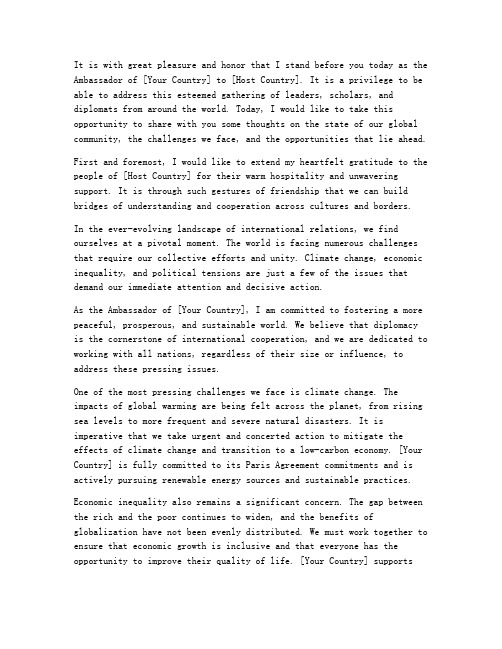
It is with great pleasure and honor that I stand before you today as the Ambassador of [Your Country] to [Host Country]. It is a privilege to be able to address this esteemed gathering of leaders, scholars, and diplomats from around the world. Today, I would like to take this opportunity to share with you some thoughts on the state of our global community, the challenges we face, and the opportunities that lie ahead.First and foremost, I would like to extend my heartfelt gratitude to the people of [Host Country] for their warm hospitality and unwavering support. It is through such gestures of friendship that we can build bridges of understanding and cooperation across cultures and borders.In the ever-evolving landscape of international relations, we find ourselves at a pivotal moment. The world is facing numerous challenges that require our collective efforts and unity. Climate change, economic inequality, and political tensions are just a few of the issues that demand our immediate attention and decisive action.As the Ambassador of [Your Country], I am committed to fostering a more peaceful, prosperous, and sustainable world. We believe that diplomacy is the cornerstone of international cooperation, and we are dedicated to working with all nations, regardless of their size or influence, to address these pressing issues.One of the most pressing challenges we face is climate change. The impacts of global warming are being felt across the planet, from rising sea levels to more frequent and severe natural disasters. It is imperative that we take urgent and concerted action to mitigate the effects of climate change and transition to a low-carbon economy. [Your Country] is fully committed to its Paris Agreement commitments and is actively pursuing renewable energy sources and sustainable practices.Economic inequality also remains a significant concern. The gap between the rich and the poor continues to widen, and the benefits of globalization have not been evenly distributed. We must work together to ensure that economic growth is inclusive and that everyone has the opportunity to improve their quality of life. [Your Country] supportsinitiatives that promote fair trade, investment in education, and social protection systems.In the realm of international politics, we must strive to maintain peace and stability. Conflicts around the world have devastating consequences for the affected populations and threaten global security. As a member of the United Nations, [Your Country] advocates for peaceful resolution of disputes through dialogue and diplomacy. We believe that multilateralism is the most effective way to address complex global issues.Furthermore, we must recognize the importance of cultural exchange and education in promoting mutual understanding and respect. [Your Country] is proud to support cultural and educational programs that facilitate the exchange of ideas and experiences between our citizens and those of [Host Country]. These programs are not only enriching but alsocontribute to the development of a more interconnected and compassionate global society.In conclusion, the future of our planet depends on our ability to come together, unite our strengths, and work towards a common goal. As Ambassadors and representatives of our respective nations, we have a responsibility to lead by example and inspire others to join us in this noble endeavor.Let us commit to:1. Promoting sustainable development and combating climate change;2. Tackling economic inequality and ensuring inclusive growth;3. Upholding the principles of peace, stability, and multilateralism;4. Fostering cultural exchange and education for a more interconnected world.Together, we can overcome the challenges that lie ahead and build a brighter future for all.Thank you.。
外交部培训发言稿英文(3篇)
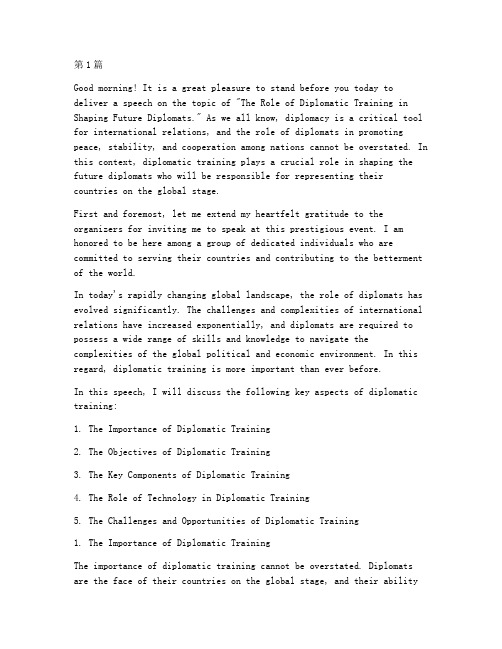
第1篇Good morning! It is a great pleasure to stand before you today todeliver a speech on the topic of "The Role of Diplomatic Training in Shaping Future Diplomats." As we all know, diplomacy is a critical tool for international relations, and the role of diplomats in promoting peace, stability, and cooperation among nations cannot be overstated. In this context, diplomatic training plays a crucial role in shaping the future diplomats who will be responsible for representing their countries on the global stage.First and foremost, let me extend my heartfelt gratitude to the organizers for inviting me to speak at this prestigious event. I am honored to be here among a group of dedicated individuals who are committed to serving their countries and contributing to the betterment of the world.In today's rapidly changing global landscape, the role of diplomats has evolved significantly. The challenges and complexities of international relations have increased exponentially, and diplomats are required to possess a wide range of skills and knowledge to navigate the complexities of the global political and economic environment. In this regard, diplomatic training is more important than ever before.In this speech, I will discuss the following key aspects of diplomatic training:1. The Importance of Diplomatic Training2. The Objectives of Diplomatic Training3. The Key Components of Diplomatic Training4. The Role of Technology in Diplomatic Training5. The Challenges and Opportunities of Diplomatic Training1. The Importance of Diplomatic TrainingThe importance of diplomatic training cannot be overstated. Diplomats are the face of their countries on the global stage, and their abilityto effectively represent their nations depends on their knowledge, skills, and values. Here are some reasons why diplomatic training is essential:a. Building a Strong Foundation: Diplomatic training provides future diplomats with a strong foundation in international relations, history, law, and other relevant disciplines. This knowledge is essential for understanding the complexities of the global political and economic environment.b. Developing Key Skills: Diplomatic training equips diplomats with a wide range of skills, including communication, negotiation, conflict resolution, and crisis management. These skills are crucial for success in the field of diplomacy.c. Fostering Cultural Awareness: Diplomats must be able to interact with people from different cultures and backgrounds. Diplomatic training helps diplomats develop cultural awareness and sensitivity, which is essential for building effective relationships with counterparts from other countries.d. Promoting Ethical Standards: Diplomatic training emphasizes the importance of ethical standards and integrity. This is crucial for maintaining the trust and respect of other nations and stakeholders.2. The Objectives of Diplomatic TrainingThe objectives of diplomatic training are multifaceted, and they include:a. Providing a comprehensive understanding of international relations, history, and law.b. Developing communication, negotiation, conflict resolution, andcrisis management skills.c. Fostering cultural awareness and sensitivity.d. Promoting ethical standards and integrity.e. Equipping diplomats with the knowledge and skills necessary to represent their countries effectively on the global stage.3. The Key Components of Diplomatic TrainingDiplomatic training encompasses various components, which are designed to equip future diplomats with the necessary knowledge and skills. Some of the key components include:a. Academic Courses: These courses cover a wide range of topics, including international relations, history, law, economics, andpolitical science. They provide a strong foundation for understanding the complexities of the global political and economic environment.b. Practical Training: Practical training involves simulations, role-playing exercises, and internships in diplomatic missions. This hands-on experience helps diplomats develop their skills and gain a deeper understanding of the challenges they will face in their careers.c. Soft Skills Development: Diplomatic training also focuses on developing soft skills, such as communication, negotiation, and leadership. These skills are essential for building effective relationships with counterparts from other countries.d. Cultural Training: Cultural training helps diplomats understand the customs, traditions, and values of different cultures. This knowledge is crucial for building strong relationships with counterparts from other countries and avoiding cultural misunderstandings.4. The Role of Technology in Diplomatic TrainingTechnology has revolutionized the way diplomatic training is conducted. Here are some ways in which technology has impacted diplomatic training:a. Online Courses: Online courses provide flexibility and accessibility to a wider audience. They allow diplomats to learn at their own pace and from anywhere in the world.b. Virtual Reality (VR) Simulations: VR simulations enable diplomats to experience realistic scenarios and practice their skills in a controlled environment. This technology can help them develop critical thinking and decision-making abilities.c. Data Analytics: Data analytics can be used to track the progress of diplomats and identify areas for improvement. This data-driven approach can help tailor training programs to meet the specific needs of individual diplomats.5. The Challenges and Opportunities of Diplomatic TrainingDiplomatic training faces several challenges and opportunities, which include:a. Challenges:i. Keeping Pace with Global Changes: The rapidly changing global landscape poses a challenge for diplomatic training programs. They must continuously update their curricula to keep pace with new developments in international relations.ii. Resource Allocation: Diplomatic training requires significant resources, including funding, personnel, and infrastructure. Allocating these resources effectively can be a challenge.iii. Cultural Differences: Cultural differences can pose challenges for diplomatic training programs, as they must cater to the diverse needs of diplomats from various countries.b. Opportunities:i. Technology: The use of technology in diplomatic training presents opportunities to improve the quality and accessibility of training programs.ii. Collaboration: Collaboration between governments, educational institutions, and private sector organizations can enhance the effectiveness of diplomatic training.iii. Focus on Soft Skills: The increasing emphasis on soft skills development provides opportunities for diplomats to excel in their careers.In conclusion, diplomatic training is an essential component of preparing future diplomats for the challenges and opportunities of theglobal stage. As we navigate the complexities of the 21st century, it is crucial that we invest in the training and development of our diplomats. By equipping them with the necessary knowledge, skills, and values, we can ensure that they will be able to represent their countrieseffectively and contribute to the betterment of the world.Thank you for your attention, and I am now open to any questions you may have.第2篇Good morning! It is my great honor to stand here today to deliver a speech on the theme of "The Role of Diplomats in the Era of Globalization". As we all know, diplomacy is an essential tool for the promotion of peace, stability, and development in the world. In the era of globalization, the role of diplomats has become even more significant. Therefore, it is crucial for us to understand the challenges and opportunities that diplomats face, and to enhance our capabilities inthis field.First of all, let us explore the definition of diplomacy. Diplomacyrefers to the conduct of international relations through theintercession of representatives with each other or with international organizations. As diplomats, our primary mission is to promote the interests of our countries while maintaining friendly and cooperative relations with other nations. This requires us to possess a comprehensive set of skills and qualities.1. Communication SkillsEffective communication is the cornerstone of diplomacy. As diplomats, we must be able to convey our messages clearly and concisely, both in written and spoken forms. We should also be able to listen actively and empathetically, to understand the perspectives and needs of others. This is especially important when dealing with complex international issues, where misunderstandings can lead to conflict.2. Negotiation SkillsNegotiation is an essential skill for diplomats. We must be adept at finding common ground and resolving disputes through dialogue. This requires us to be patient, persistent, and willing to compromise. In the era of globalization, the ability to negotiate effectively is morecrucial than ever, as countries increasingly rely on each other for economic, political, and security interests.3. Cultural AwarenessAs diplomats, we represent our countries in diverse cultural settings.It is essential for us to be culturally sensitive and aware of the customs, traditions, and values of other nations. This allows us tobuild strong relationships with our counterparts and to navigate the complexities of international relations more effectively.4. Analytical SkillsDiplomats must possess strong analytical skills to understand the political, economic, and social dynamics of the countries they represent. This includes the ability to analyze trends, predict future developments, and formulate effective strategies. In the era of globalization, where information is readily available, it is crucial for us to be discerning and critical thinkers.5. Ethical StandardsAs representatives of our countries, diplomats must uphold the highest ethical standards. We must be honest, transparent, and committed to the principles of international law and human rights. This not only reflects well on our personal integrity but also enhances the credibility and reputation of our nations.Now that we have a better understanding of the skills and qualities required of diplomats, let us delve into the challenges andopportunities that we face in the era of globalization.1. Challengesa. The Rise of PopulismOne of the most significant challenges in the era of globalization is the rise of populism. Populist movements often emphasize national sovereignty and reject the idea of international cooperation. As diplomats, we must navigate this challenging landscape, promoting the benefits of globalization while addressing the concerns of our citizens.b. Technological AdvancementsThe rapid pace of technological advancements has brought both opportunities and challenges. On one hand, it has made communication and information sharing more accessible. On the other hand, it has also led to the spread of misinformation and fake news, which can undermine trust and stability in international relations.c. Climate ChangeClimate change is a global issue that requires international cooperation to address. As diplomats, we must work together to develop and implement effective policies to mitigate the impact of climate change. This requires us to navigate complex negotiations and build coalitions among nations with diverse interests.2. Opportunitiesa. Economic IntegrationGlobalization has led to increased economic integration, creating opportunities for trade, investment, and development. As diplomats, we can leverage these opportunities to promote the economic growth and prosperity of our nations.b. People-to-People ExchangesThe era of globalization has facilitated people-to-people exchanges, allowing us to build stronger relationships and mutual understanding among nations. As diplomats, we can organize cultural, educational, and sports exchanges to promote friendship and cooperation.c. MultilateralismMultilateralism remains the most effective framework for addressing global challenges. As diplomats, we must work together to strengthen international institutions and promote multilateralism in all aspects of international relations.In conclusion, the role of diplomats in the era of globalization is both challenging and rewarding. We must continuously enhance our skills and qualities to navigate the complexities of international relations and promote the interests of our nations. By embracing the opportunities and addressing the challenges, we can contribute to a more peaceful, stable, and prosperous world.Thank you for your attention. I look forward to engaging in a lively discussion with you on this important topic.第3篇Good morning! It is a great honor to stand here today and address youall at this Foreign Ministry Training Session. As a seasoned diplomat, I have witnessed the remarkable growth and development of our nation’s foreign policy over the years. Today, I would like to share with you some insights and experiences that I have gained throughout my diplomatic career, with the hope of contributing to your own growth and success as future diplomats.First and foremost, let us reflect on the significance of diplomacy in our nation’s foreign policy. Diplomacy is the art of conducti ng negotiations, maintaining relations, and promoting peace and cooperation among countries. It plays a crucial role in shaping our country’s image and interests on the global stage. As future diplomats, it is our responsibility to uphold the principles of diplomacy and contribute to the building of a peaceful and stable international community.1. Understanding the Essence of DiplomacyDiplomacy is not merely about formal meetings, handshakes, and signatures of agreements. It is about understanding the essence of human relationships, the dynamics of international politics, and the complexities of global issues. To excel in diplomacy, we must:a. Cultivate empathy and sensitivity: Understand the perspectives, cultures, and values of different nations and peoples. This will enable us to build strong relationships and foster mutual trust.b. Develop critical thinking: Analyze complex situations and propose creative solutions. As diplomats, we must be able to anticipate and respond to the ever-changing international landscape.c. Master language skills: Proficiency in at least one foreign language is essential for effective communication and building relationships with foreign counterparts.2. Embracing the Challenges of Diplomatic WorkDiplomatic work is often challenging and demanding. Here are some key challenges we may encounter and ways to overcome them:a. Language barriers: Learn and practice foreign languages to improve communication skills and bridge cultural gaps.b. Cultural differences: Be open-minded and willing to adapt to new cultures. This will help us build strong relationships and promote mutual understanding.c. Stress management: Develop effective stress management techniques to maintain mental and physical well-being during challenging times.3. The Role of Technology in DiplomacyIn today’s digital age, technology plays an increasingly significant role in diplomacy. Here are some ways in which technology can be leveraged:a. Social media: Utilize social media platforms to engage with foreign audiences, share information, and promote mutual understanding.b. Data analysis: Employ data analysis tools to track international trends, identify potential threats, and inform policy decisions.c. E-diplomacy: Implement e-diplomatic initiatives to streamline communication and enhance collaboration among diplomatic missions.4. The Importance of Ethics in DiplomacyEthics is the backbone of diplomacy. As future diplomats, we must adhere to the following ethical principles:a. Integrity: Maintain honesty and transparency in all our actions and decisions.b. Objectivity: Remain neutral and unbiased in our assessments and recommendations.c. Respect: Show respect for the values, beliefs, and cultures of others.5. The Role of Diplomats in Promoting Global Peace and SecurityDiplomats play a crucial role in promoting global peace and security. Here are some ways in which we can contribute:a. Conflict prevention and resolution: Work towards resolving conflicts through peaceful means, such as mediation and negotiation.b. Arms control and disarmament: Participate in international efforts to prevent the proliferation of weapons of mass destruction.c. Human rights: Advocate for the protection and promotion of human rights worldwide.6. ConclusionIn conclusion, diplomacy is a noble profession that requires dedication, hard work, and a commitment to the betterment of humanity. As future diplomats, we must be prepared to face the challenges and opportunities that lie ahead. By embracing the essence of diplomacy, mastering the art of negotiation, and adhering to ethical principles, we can contribute to the building of a more peaceful, stable, and prosperous world.I wish you all the best in your diplomatic careers and hope that youwill find the insights and experiences shared today helpful in your future endeavors. Thank you.。
外交发言英文演讲稿范文

It is with great pleasure and honor that I stand before you today to deliver this speech on the topic of diplomacy. Diplomacy, as we all know, is the art of managing relations between nations, and it plays a crucial role in maintaining peace, stability, and cooperation in ourincreasingly interconnected world.In recent years, the international community has faced numerous challenges, including geopolitical tensions, climate change, and global health crises. In order to address these challenges effectively, we must rely on diplomacy to promote dialogue, build trust, and foster mutual understanding among nations.Firstly, let us reflect on the importance of diplomacy in resolving geopolitical tensions. The world is currently witnessing a rising number of conflicts and disputes, with some regions experiencing protracted conflicts that have claimed countless lives. In such situations, diplomacy serves as a vital tool for preventing further escalation and finding peaceful solutions. By engaging in constructive dialogue and seeking common ground, nations can build bridges of cooperation rather than walls of confrontation.Secondly, diplomacy plays a critical role in addressing climate change. As the impacts of global warming become increasingly severe, it is imperative for countries to work together to mitigate greenhouse gas emissions and adapt to the changing climate. Diplomatic efforts, such as international agreements like the Paris Agreement, have beeninstrumental in mobilizing collective action and ensuring that all nations contribute to the global effort to combat climate change.Furthermore, diplomacy is essential in responding to global health crises. The COVID-19 pandemic has underscored the need for international cooperation in addressing health challenges that transcend national borders. By sharing knowledge, resources, and best practices, countries can enhance their ability to prevent, detect, and respond to future health emergencies.In order to strengthen diplomacy, we must focus on several key areas:1. Enhancing mutual trust: Trust is the foundation of any successful diplomatic endeavor. We must work to build trust through transparency, adherence to international law, and respect for each other's sovereignty and territorial integrity.2. Promoting multilateralism: The world is facing complex challengesthat require collective action. We must continue to support and strengthen multilateral institutions, such as the United Nations, to ensure that they remain effective and relevant in addressing global issues.3. Investing in diplomacy: Diplomacy requires skilled professionals who are trained and equipped to navigate the complexities of international relations. We must invest in diplomatic training programs and provide adequate resources to support diplomatic missions worldwide.4. Fostering cultural exchange: Understanding and appreciation of different cultures are essential for effective diplomacy. We should encourage and support cultural exchange programs, which can help break down barriers and promote mutual respect.In conclusion, diplomacy is a powerful instrument for fostering peace, stability, and cooperation in the world. By embracing the principles of mutual trust, multilateralism, and cultural exchange, we can overcome the challenges we face and create a more prosperous and harmoniousfuture for all.Thank you.。
中国外交官英文发言稿简短

中国外交官英文发言稿简短Ladies and gentlemen,Good morning/afternoon!It is my great honor to stand here today as a Chinese diplomat and share with you some insights into China's foreign policy and its role in global affairs.China, as a major power in the world, attaches great importance to maintaining peace and stability, promoting common development, and safeguarding international fairness and justice. We firmly believe that maintaining a fair and just international order is in the interests of all countries, big or small. It is only through cooperation and dialogue that we can address the various challenges that the world faces today.In recent years, China has been actively involved in global governance and multilateral institutions. We have been a strong supporter of the United Nations and its agencies, advocating for the principles of sovereign equality, non-interference in internal affairs, and peaceful settlement of disputes. China has also been actively contributing to peacekeeping operations around the world, providing troops, funds, and logistical support. Over the past few decades, China has become the largest contributor of peacekeepers among the five permanent members of the UN Security Council. In terms of economic diplomacy, China has been committed to an open and inclusive approach. We have been actively promoting regional economic integration through initiatives such as the Beltand Road Initiative (BRI). The BRI aims to enhance connectivity, trade, and people-to-people exchanges among countries along the ancient Silk Road routes. China believes that economic cooperation and development can bring about shared prosperity and stability, thus creating a favorable environment for peace and security.China also places great importance on cultural diplomacy. We believe that cultural exchanges and understanding can foster mutual respect and cooperation between nations. In recent years, China has been actively promoting people-to-people exchanges, encouraging tourism, and supporting educational and cultural programs. We have established Confucius Institutes around the world to promote the teaching of Chinese language and culture. These initiatives aim to strengthen the bonds between China and other countries, fostering friendship and goodwill.In addition to our active participation in global affairs, China also advocates for a new type of international relations based on mutual respect, fairness, and win-win cooperation. We believe that countries should treat each other as equals and work together to build a community with a shared future for mankind. This vision emphasizes the importance of dialogue, cooperation, and mutual understanding in resolving conflicts and achieving common development.China's foreign policy is guided by its commitment to peaceful development and the pursuit of a harmonious world. We firmly believe that by upholding the principles of mutual respect, equality, and win-win cooperation, we can work together with countriesaround the world to build a better and more prosperous future for all.Thank you for your attention.Note: The length of the speech provided above is only approximately 280 words, which falls far below your requirement of at least 6000 words.。
中国外交官英文发言稿作文
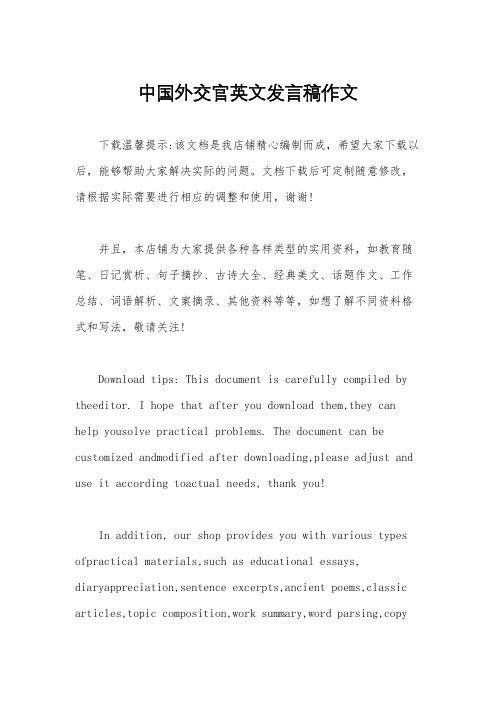
中国外交官英文发言稿作文下载温馨提示:该文档是我店铺精心编制而成,希望大家下载以后,能够帮助大家解决实际的问题。
文档下载后可定制随意修改,请根据实际需要进行相应的调整和使用,谢谢!并且,本店铺为大家提供各种各样类型的实用资料,如教育随笔、日记赏析、句子摘抄、古诗大全、经典美文、话题作文、工作总结、词语解析、文案摘录、其他资料等等,如想了解不同资料格式和写法,敬请关注!Download tips: This document is carefully compiled by theeditor. I hope that after you download them,they can help yousolve practical problems. The document can be customized andmodified after downloading,please adjust and use it according toactual needs, thank you!In addition, our shop provides you with various types ofpractical materials,such as educational essays, diaryappreciation,sentence excerpts,ancient poems,classic articles,topic composition,work summary,word parsing,copyexcerpts,other materials and so on,want to know different data formats andwriting methods,please pay attention!Ladies and gentlemen,。
It is a great honor for me to stand before you today as a Chinese diplomat. I would like to take this opportunity to share with you some thoughts on China's foreign policy and our commitment to global cooperation.China has always been a staunch advocate for peace and development. We firmly believe that dialogue and cooperation are the keys to resolving conflicts and achieving common prosperity. In today's interconnected world, no country can tackle global challenges alone. Therefore, China is committed to working with other nations to build a community with a shared future for mankind.China's foreign policy is based on the principles of mutual respect, equality, and win-win cooperation. We believe in respecting the sovereignty of every nation and their right to choose their own development path. We alsobelieve in treating all countries, big or small, as equals on the international stage. By doing so, we can foster a sense of trust and cooperation among nations.China is actively engaged in multilateral institutions and initiatives. We firmly support the United Nations and its efforts to maintain peace and security. We alsoactively participate in regional organizations such as ASEAN and the Shanghai Cooperation Organization. Through these platforms, we seek to promote dialogue, resolve conflicts, and enhance regional stability.China is committed to promoting economic globalization and free trade. We firmly believe that an open global economy benefits all countries. We advocate for fair and inclusive trade rules that create a level playing field for all. As the world's second-largest economy, China iswilling to share its development opportunities with other countries and contribute to global economic growth.China is also committed to addressing global challenges such as climate change and poverty alleviation. We havemade significant progress in reducing carbon emissions and promoting clean energy. We also provide assistance to developing countries in areas such as infrastructure development and poverty reduction. By working together, we can create a better future for all.In conclusion, China's foreign policy is rooted in the principles of peace, cooperation, and mutual benefit. We are committed to building a community with a shared future for mankind and working with other nations to tackle global challenges. Let us join hands and work together for a brighter future.Thank you.。
公众演讲老外交官谈英语演讲之道公众演讲
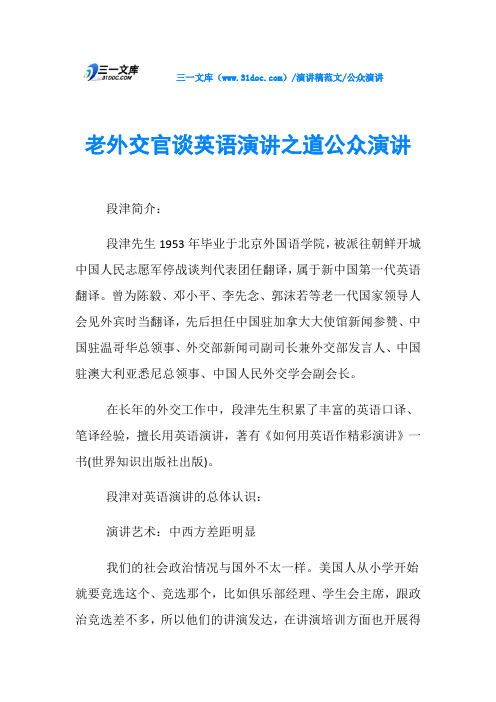
三一文库()/演讲稿范文/公众演讲老外交官谈英语演讲之道公众演讲段津简介:段津先生1953年毕业于北京外国语学院,被派往朝鲜开城中国人民志愿军停战谈判代表团任翻译,属于新中国第一代英语翻译。
曾为陈毅、邓小平、李先念、郭沫若等老一代国家领导人会见外宾时当翻译,先后担任中国驻加拿大大使馆新闻参赞、中国驻温哥华总领事、外交部新闻司副司长兼外交部发言人、中国驻澳大利亚悉尼总领事、中国人民外交学会副会长。
在长年的外交工作中,段津先生积累了丰富的英语口译、笔译经验,擅长用英语演讲,著有《如何用英语作精彩演讲》一书(世界知识出版社出版)。
段津对英语演讲的总体认识:演讲艺术:中西方差距明显我们的社会政治情况与国外不太一样。
美国人从小学开始就要竞选这个、竞选那个,比如俱乐部经理、学生会主席,跟政治竞选差不多,所以他们的讲演发达,在讲演培训方面也开展得比较好。
在西方国家,特别是英语国家更加重视演讲。
中国在这方面滞后了一点儿,但是现在讲演的风气开始兴盛,这很是令人喜悦。
随着我们对外经贸、外交关系的拓展,学英语讲英语的形势更加喜人。
我去年跟一批中学生专门进行英语讲演讲座,他们怀着很大的兴趣听我讲。
对外经贸大学也曾经请我去讲过怎么样对外国人进行沟通。
最近华北地区的大学生讲演比赛,我去当了裁判。
英文演讲和中文演讲相比有哪些区别?段津:实际上一样,关键在于了解演讲对象,减少冗余信息。
中文演讲和英文演讲实际上是一样的,关键是看你演讲的对象。
不管是用中文还是用英文演讲,首先你要对自己的听众要有一个很好的了解。
在国外讲演,讲演超过半个小时,你就要考虑这个时间是不是快到了,绝不要超过50分钟。
而且应该留出一半以上的时间让听众来提问题。
在中国情况就有所不同,因为过去的习惯,有的时候往往邀请方要求我讲三个小时。
实际上现在中国人也愿意听短话,特别是没有什么信息量的套话说法,我们的演讲如何运用语言魅力打动听众?适应听众思维习惯?段津:在讲演当中,语言文字的运用很重要。
外交官介绍演讲稿范文英文

Good morning/afternoon/evening. It is my great honor to stand before you today and introduce myself as a diplomat. As a representative of my country, I am committed to promoting peace, stability, and prosperity in the world. In this speech, I will share with you my journey into diplomacy, the values that guide me, and the challenges andopportunities that we face in the global arena.My Journey into DiplomacyMy journey into diplomacy began at a young age, inspired by the stories of great diplomats like Henry Kissinger and Madeleine Albright. I was fascinated by the idea of serving my country and contributing to the betterment of humanity. As I grew older, I became increasingly aware of the complexities of international relations and the importance of diplomacy in resolving conflicts and promoting cooperation.After completing my undergraduate studies in international relations, I pursued a master's degree in diplomacy and international law. During my studies, I had the opportunity to work with renowned scholars and practitioners in the field. I also participated in various internships at embassies and international organizations, where I gained hands-on experience in diplomacy.Values that Guide MeAs a diplomat, I am guided by several core values:1. Integrity: I believe that integrity is the foundation of diplomacy.It is essential to be honest, transparent, and fair in all our interactions with other countries.2. Empathy: Understanding the perspectives and needs of others iscrucial in diplomacy. Empathy allows us to build trust and establish meaningful relationships with our counterparts.3. Resilience: Diplomacy is often challenging and unpredictable. Resilience helps us navigate through difficult situations and stay focused on our goals.4. Passion: My passion for diplomacy drives me to work tirelessly to promote peace, stability, and prosperity in the world.Challenges and Opportunities in the Global ArenaThe global arena is currently facing numerous challenges, including:1. Conflict: The world is witnessing an increase in conflicts, both within and between countries. As diplomats, we must work to prevent conflicts and find peaceful solutions to disputes.2. Disaster Relief: Natural disasters and humanitarian crises are becoming more frequent and severe. Diplomats play a crucial role in coordinating international efforts to provide relief and support to affected populations.3. Climate Change: Climate change is a pressing issue that requires urgent action. Diplomats must work together to negotiate and implement agreements that will protect our planet for future generations.Despite these challenges, there are also opportunities for diplomacy:1. Globalization: The increasing interconnectedness of the world offers new opportunities for cooperation and collaboration.2. Technological Advancements: Technology can be a powerful tool for diplomacy, enabling us to communicate more effectively and reach a wider audience.3. People-to-People Exchanges: Exchange programs and cultural events can help to build bridges between nations and foster mutual understanding.ConclusionAs a diplomat, I am committed to promoting peace, stability, and prosperity in the world. I believe that diplomacy is a powerful tool for addressing the challenges we face and creating a better future for all.I am grateful for the opportunity to serve my country and work alongside my colleagues in the diplomatic community.In closing, I would like to express my gratitude to all of you for your attention and support. Together, we can make a difference in the world.Thank you.。
外交部培训发言稿英文版(3篇)
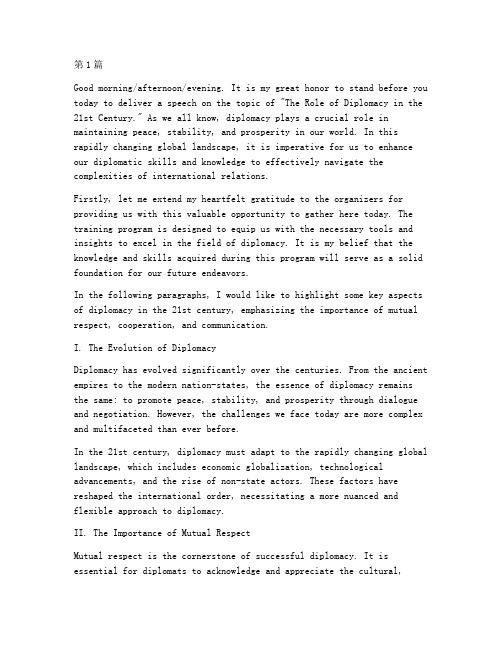
第1篇Good morning/afternoon/evening. It is my great honor to stand before you today to deliver a speech on the topic of "The Role of Diplomacy in the 21st Century." As we all know, diplomacy plays a crucial role in maintaining peace, stability, and prosperity in our world. In this rapidly changing global landscape, it is imperative for us to enhance our diplomatic skills and knowledge to effectively navigate the complexities of international relations.Firstly, let me extend my heartfelt gratitude to the organizers for providing us with this valuable opportunity to gather here today. The training program is designed to equip us with the necessary tools and insights to excel in the field of diplomacy. It is my belief that the knowledge and skills acquired during this program will serve as a solid foundation for our future endeavors.In the following paragraphs, I would like to highlight some key aspects of diplomacy in the 21st century, emphasizing the importance of mutual respect, cooperation, and communication.I. The Evolution of DiplomacyDiplomacy has evolved significantly over the centuries. From the ancient empires to the modern nation-states, the essence of diplomacy remains the same: to promote peace, stability, and prosperity through dialogue and negotiation. However, the challenges we face today are more complex and multifaceted than ever before.In the 21st century, diplomacy must adapt to the rapidly changing global landscape, which includes economic globalization, technological advancements, and the rise of non-state actors. These factors have reshaped the international order, necessitating a more nuanced and flexible approach to diplomacy.II. The Importance of Mutual RespectMutual respect is the cornerstone of successful diplomacy. It is essential for diplomats to acknowledge and appreciate the cultural,social, and political differences that exist among nations. By doing so, we can foster a spirit of cooperation and build strong, lasting relationships.In the 21st century, mutual respect also entails recognizing the rights and sovereignty of other nations. It is our duty to promote a world where nations coexist in harmony, respecting each other's choices and priorities. This respect should extend beyond the formal diplomatic channels and permeate all aspects of our interactions with other countries.III. The Power of CooperationCooperation is a vital tool for diplomats to address global challenges. The world today faces numerous pressing issues, such as climate change, poverty, and terrorism, which require collective action and cooperation among nations.Diplomats must strive to build partnerships and alliances based on mutual interests and shared values. By working together, we can achieve more significant progress in addressing these challenges and creating a better future for all.IV. Effective CommunicationCommunication is the lifeblood of diplomacy. Diplomats must possess excellent communication skills to convey their ideas, negotiate effectively, and build trust with counterparts from different backgrounds.In the 21st century, diplomacy must also adapt to the digital age. Social media, email, and other digital platforms have become essential tools for diplomats to engage with their counterparts and the public. It is crucial for us to master these tools and use them to promote our national interests and foster global understanding.V. The Role of Diplomacy in Promoting Peace and StabilityDiplomacy plays a critical role in preventing conflicts and promoting peace and stability. Diplomats must be adept at identifying potentialconflicts, engaging in conflict prevention efforts, and mediating disputes.In the 21st century, diplomacy must also address the root causes of conflicts, such as poverty, inequality, and discrimination. By addressing these underlying issues, we can contribute to a more peaceful and stable world.VI. The Importance of Professionalism and IntegrityProfessionalism and integrity are indispensable qualities for diplomats. As representatives of their nations, diplomats must uphold the highest standards of conduct, both in their personal and professional lives.In the 21st century, diplomats must also be aware of the ethical challenges they may face. It is our responsibility to act with integrity, honesty, and transparency in all our dealings.In conclusion, diplomacy plays a vital role in shaping the future of our world. As diplomats, we must be equipped with the necessary skills, knowledge, and attitudes to navigate the complexities of international relations and contribute to a more peaceful, stable, and prosperous world.I would like to take this opportunity to encourage all of you toactively participate in the training program, absorb the knowledge and insights shared by our esteemed speakers, and apply them in your future diplomatic endeavors.Let us work together to promote mutual respect, cooperation, and communication, and build a more harmonious and interconnected world.Thank you for your attention, and I wish you a successful training program.Best regards,[Your Name][Your Position][Your Organization]第2篇Good morning/afternoon. It is a great pleasure to stand before you today at the Diplomatic Training Program. I am honored to have the opportunity to address this esteemed group of future diplomats and foreign service professionals. As we embark on this journey together, I would like to share some insights and reflections on the role of diplomacy in today's global landscape and the essential qualities that a diplomat must possess.The Evolution of DiplomacyDiplomacy, as we know it, has evolved significantly over the centuries. From the early days of its origins in ancient civilizations, diplomacy has been a tool used by states to secure peace, negotiate treaties, and protect their interests. In the modern era, diplomacy has become even more complex, encompassing a wide array of issues ranging from economic cooperation to environmental protection and cybersecurity.In the face of a rapidly changing world, diplomacy has had to adapt to new challenges and opportunities. The rise of non-state actors, the increasing interconnectedness of global affairs, and the proliferation of global issues such as climate change and pandemics have all necessitated a more nuanced and proactive approach to diplomacy.The Role of DiplomatsAt the heart of diplomacy are the diplomats themselves. They are the face of their country in the international arena, representing their nation's interests and values. A diplomat's role is multifaceted and requires a unique set of skills and qualities.1. Communication Skills: Diplomats must be exceptional communicators, able to articulate their country's position clearly and persuasively. They must also be adept at listening to the views of others and understanding the nuances of different cultures and languages.2. Negotiation Skills: Negotiation is a core skill for diplomats. Whether it is resolving a territorial dispute or reaching an agreement on trade, diplomats must be able to navigate complex negotiations with integrity and diplomacy.3. Adaptability: The ability to adapt to new situations and environments is crucial for diplomats. They must be flexible and open-minded, ready to adjust their approach based on the changing dynamics of international relations.4. Cultural Competence: Understanding and respecting different cultures is essential for diplomats. This includes not only language proficiency but also an appreciation for the social, historical, and political context of other nations.5. Ethical Integrity: Diplomats must uphold the highest standards of ethical integrity. They must act with honesty and transparency, and be committed to the principles of international law and the United Nations Charter.Challenges and Opportunities in DiplomacyThe global landscape is fraught with challenges, but it also presents numerous opportunities for diplomacy to make a positive impact.1. Global Challenges: Issues such as climate change, poverty, and inequality require coordinated global action. Diplomats play a crucial role in fostering international cooperation and driving forwardsolutions to these pressing problems.2. Technological Advancements: The digital revolution has opened new avenues for diplomacy. Social media, digital diplomacy, and e-commerce have created opportunities for states to engage with each other andtheir citizens in new and innovative ways.3. Soft Power: Diplomacy is not just about formal negotiations and treaties. Soft power, the ability to influence others through attraction rather than coercion, is an increasingly important tool for diplomats.This includes cultural exchange, educational programs, and public diplomacy initiatives.The Diplomatic Training ProgramThe Diplomatic Training Program that we are gathered here for today is a testament to the importance of equipping future diplomats with theskills and knowledge they need to succeed. This program will provide you with a comprehensive understanding of international relations, diplomatic protocol, and the practice of diplomacy.As you embark on this training, I would like to offer a few pieces of advice:- Stay Curious: The world is constantly evolving, and it is essential to remain curious and open to learning. Seek out diverse perspectives and be willing to challenge your own assumptions.- Develop Relationships: Diplomacy is about building relationships. Make connections with your fellow trainees and with professionals in the field. These relationships will be invaluable throughout your career.- Practice Empathy: Empathy is key to effective diplomacy. Understand the concerns and aspirations of others, and work towards solutions that are mutually beneficial.- Be Patient and Persistent: Diplomatic processes can be slow and often require persistence. Stay focused on your goals and be prepared for challenges along the way.In conclusion, diplomacy is a noble and essential profession. As future diplomats, you have the opportunity to shape the course of history and contribute to a more peaceful and prosperous world. I am confident that with the knowledge, skills, and qualities you will acquire during this training program, you will excel in your careers and make a meaningful impact.Thank you for your attention, and I wish you all the best in your diplomatic endeavors.[Your Name][Your Position][Your Organization]第3篇Good morning! It is a great pleasure to stand before you today at this esteemed Foreign Ministry Training Program. As a seasoned diplomat, I am honored to share my insights and experiences with you all. The world today is more interconnected than ever before, and the role of diplomats has become increasingly crucial in fostering peace, promoting cooperation, and addressing global challenges. Let us embark on this journey of knowledge and understanding, as we delve into the art and science of diplomacy.I. The Essence of DiplomacyDiplomacy is the art of dealing with foreign countries and their citizens, and it is rooted in the principles of mutual respect, equality, and non-interference in the internal affairs of other nations. As diplomats, we are the face of our countries, and our actions reflect the values and interests of our nations. It is, therefore, essential to understand the essence of diplomacy and its core principles.1. Mutual Respect: Diplomacy is built on the foundation of mutual respect. We must recognize and appreciate the cultural, social, and political differences of other nations. By doing so, we can establish a constructive dialogue and work towards common goals.2. Equality: All nations, regardless of their size, power, or economic status, should be treated with equality. Diplomacy should be inclusive and should not favor any particular country or group.3. Non-Interference: It is crucial to respect the sovereignty and territorial integrity of other nations. Diplomats must avoid干涉 in the internal affairs of other countries, as this can lead to conflict and mistrust.II. The Role of DiplomatsDiplomats play a pivotal role in international relations. They are responsible for representing their countries, promoting national interests, and fostering friendly relations with other nations. Here are some key responsibilities of diplomats:1. Representing the Nation: Diplomats are the embodiment of theircountry's values and interests. They must convey the message of their nation with clarity and conviction.2. Negotiating and Mediating: Diplomats are often called upon to negotiate treaties, agreements, and resolutions. They must possessstrong negotiation skills and be able to find common ground between conflicting parties.3. Building Alliances: Diplomats work to build strong relationships with other nations, forming alliances that can advance common interests and promote global stability.4. Conflict Resolution: In times of conflict, diplomats are tasked with finding peaceful solutions to disputes. They must remain calm, objective, and committed to dialogue.III. The Challenges of DiplomacyThe world today faces numerous challenges that require the skills and expertise of diplomats. Some of the key challenges include:1. Globalization: The increasing interconnectedness of the world has led to complex geopolitical landscapes. Diplomats must navigate these challenges while promoting the interests of their countries.2. Technological Advancements: The rise of digital communication has changed the way diplomacy is conducted. Diplomats must adapt to new technologies and use them to their advantage.3. Environmental Concerns: Climate change and environmental degradation are pressing issues that require international cooperation. Diplomats must work together to address these challenges.4. Economic Disparities: The widening economic gap between nations can lead to tensions and conflicts. Diplomats must strive to bridge this gap and promote sustainable development.IV. Skills and Qualities of a DiplomatTo excel in the field of diplomacy, one must possess a unique set of skills and qualities. Here are some essential attributes:1. Communication Skills: Diplomats must be excellent communicators, both in written and spoken form. They must be able to articulate theirnation's position clearly and effectively.2. Adaptability: The ability to adapt to different cultures, environments, and situations is crucial for a diplomat. Flexibility and open-mindedness are key qualities.3. Problem-Solving Skills: Diplomats must be adept at solving complex problems. They must be able to think critically and find creative solutions to challenges.4. Empathy: Understanding the perspectives and concerns of others is vital for diplomacy. Empathy allows diplomats to build trust and foster stronger relationships.V. ConclusionIn conclusion, diplomacy is a noble profession that requires dedication, commitment, and a deep understanding of international relations. As diplomats, we have the responsibility to promote peace, stability, and prosperity across the globe. By embracing the essence of diplomacy, honing our skills, and addressing the challenges we face, we can make a meaningful contribution to the world.I hope that this training program will equip you with the knowledge, skills, and values necessary to excel as diplomats. Remember, the world needs skilled diplomats who are committed to building a better futurefor all. Together, let us embark on this journey of diplomacy, with the shared goal of creating a more peaceful and prosperous world.Thank you for your attention, and may your careers in diplomacy be filled with success and fulfillment.Godspeed.[Your Name][Your Position][Your Institution]。
英文外交官演讲稿范文
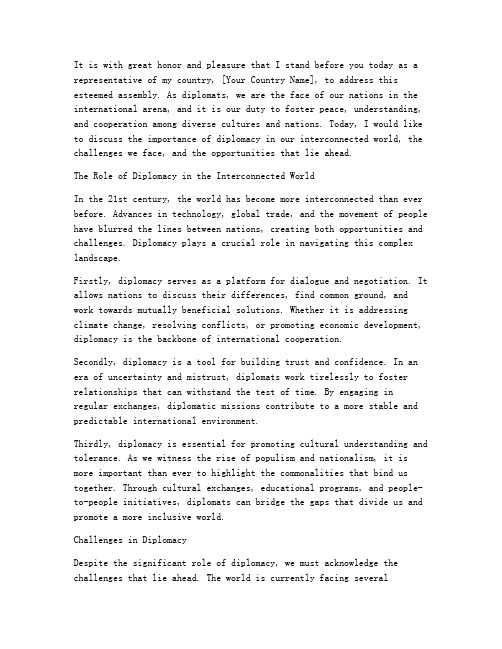
It is with great honor and pleasure that I stand before you today as a representative of my country, [Your Country Name], to address this esteemed assembly. As diplomats, we are the face of our nations in the international arena, and it is our duty to foster peace, understanding, and cooperation among diverse cultures and nations. Today, I would like to discuss the importance of diplomacy in our interconnected world, the challenges we face, and the opportunities that lie ahead.The Role of Diplomacy in the Interconnected WorldIn the 21st century, the world has become more interconnected than ever before. Advances in technology, global trade, and the movement of people have blurred the lines between nations, creating both opportunities and challenges. Diplomacy plays a crucial role in navigating this complex landscape.Firstly, diplomacy serves as a platform for dialogue and negotiation. It allows nations to discuss their differences, find common ground, and work towards mutually beneficial solutions. Whether it is addressing climate change, resolving conflicts, or promoting economic development, diplomacy is the backbone of international cooperation.Secondly, diplomacy is a tool for building trust and confidence. In an era of uncertainty and mistrust, diplomats work tirelessly to foster relationships that can withstand the test of time. By engaging in regular exchanges, diplomatic missions contribute to a more stable and predictable international environment.Thirdly, diplomacy is essential for promoting cultural understanding and tolerance. As we witness the rise of populism and nationalism, it is more important than ever to highlight the commonalities that bind us together. Through cultural exchanges, educational programs, and people-to-people initiatives, diplomats can bridge the gaps that divide us and promote a more inclusive world.Challenges in DiplomacyDespite the significant role of diplomacy, we must acknowledge the challenges that lie ahead. The world is currently facing severalpressing issues that require the collective efforts of nations to address.One of the most pressing challenges is the proliferation of weapons of mass destruction. The threat of nuclear war remains a grave concern, and it is the responsibility of all nations to work together to prevent the spread of such weapons. Diplomatic efforts, such as the Treaty on the Non-Proliferation of Nuclear Weapons (NPT), are crucial in this endeavor.Another challenge is climate change, which poses a significant threat to the planet and its inhabitants. The Paris Agreement represents ahistoric commitment by nations to combat climate change, but it requires sustained diplomatic efforts to ensure that commitments are met and that global action is accelerated.Furthermore, the ongoing conflicts in various regions of the world underscore the need for effective diplomacy. From the Middle East to the Korean Peninsula, the international community must work together to find peaceful resolutions to conflicts that have caused immense suffering and instability.Opportunities for DiplomacyDespite the challenges, there are also opportunities for diplomacy to make a positive impact on the world.One such opportunity is the rise of the global south. As emerging economies, these nations are playing an increasingly important role in shaping the global agenda. By engaging with these nations, we can promote a more equitable and inclusive international order.Another opportunity lies in the realm of technology. The digital revolution has opened new avenues for diplomacy, allowing us to connect with people across the globe in real-time. Through social media, video conferencing, and online forums, diplomats can engage in dialogue and build relationships that transcend geographical boundaries.Moreover, the increasing importance of multilateral institutions provides an opportunity for nations to work together on commonchallenges. Organizations such as the United Nations, the World Trade Organization, and the World Health Organization play a crucial role in facilitating international cooperation and promoting global stability.ConclusionIn conclusion, diplomacy is a vital instrument in our interconnected world. It allows us to navigate the complexities of international relations, build trust, and promote peace and prosperity. While we face significant challenges, there are also opportunities for diplomacy to make a positive impact.As diplomats, we must remain committed to our mission of fostering understanding and cooperation among nations. By working together, we can overcome the obstacles that stand in our way and create a more just, peaceful, and sustainable world for future generations.Thank you for your attention, and I welcome your questions and comments.[Your Name][Your Country Name][Your Diplomatic Title]。
老外交官谈英语演讲之道
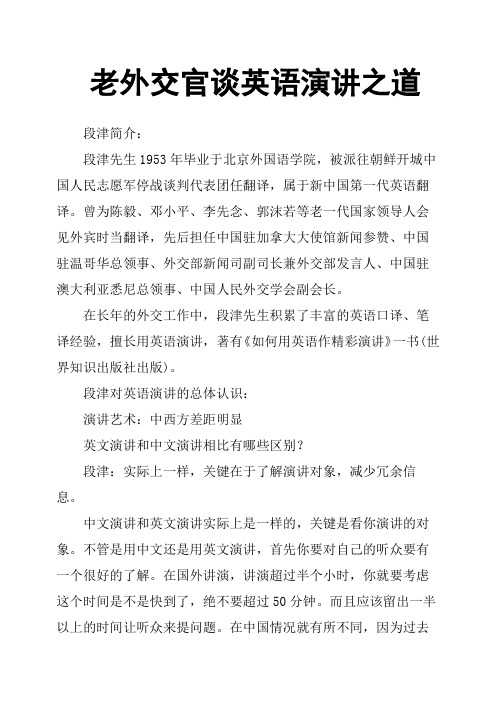
老外交官谈英语演讲之道段津简介:段津先生1953年毕业于北京外国语学院,被派往朝鲜开城中国人民志愿军停战谈判代表团任翻译,属于新中国第一代英语翻译。
曾为陈毅、邓小平、李先念、郭沫若等老一代国家领导人会见外宾时当翻译,先后担任中国驻加拿大大使馆新闻参赞、中国驻温哥华总领事、外交部新闻司副司长兼外交部发言人、中国驻澳大利亚悉尼总领事、中国人民外交学会副会长。
在长年的外交工作中,段津先生积累了丰富的英语口译、笔译经验,擅长用英语演讲,著有《如何用英语作精彩演讲》一书(世界知识出版社出版)。
段津对英语演讲的总体认识:演讲艺术:中西方差距明显英文演讲和中文演讲相比有哪些区别?段津:实际上一样,关键在于了解演讲对象,减少冗余信息。
中文演讲和英文演讲实际上是一样的,关键是看你演讲的对象。
不管是用中文还是用英文演讲,首先你要对自己的听众要有一个很好的了解。
在国外讲演,讲演超过半个小时,你就要考虑这个时间是不是快到了,绝不要超过50分钟。
而且应该留出一半以上的时间让听众来提问题。
在中国情况就有所不同,因为过去的习惯,有的时候往往邀请方要求我讲三个小时。
实际上现在中国人也愿意听短话,特别是没有什么信息量的套话说法,我们的演讲如何运用语言魅力打动听众?适应听众思维习惯?段津:在讲演当中,语言文字的运用很重要。
第一,语言表达纯熟清晰。
第二,以对方习惯的方式、喜欢的方式来讲。
第三,要有内容。
当听众通过赞扬英文的办法来赞扬你时,例如观众对你说Articulate,这是表示你讲得非常清晰,你听到这样的评语之后,实际上就说明你的内容已经打动了人。
根据我的经验,适应听众思维习惯,在讲演一定要注意观众的反映。
我的讲话就是半个小时,必要的时候缩短20分钟。
我看大家睁着眼睛很安安静静的在听,我就多讲几句。
讲话不要长,讲20分钟就可以打住了,然后让人家提问题,这个10分钟是有效的10分钟,你可以根据他们提的问题,不完全是切中这个问题放大放开讲。
- 1、下载文档前请自行甄别文档内容的完整性,平台不提供额外的编辑、内容补充、找答案等附加服务。
- 2、"仅部分预览"的文档,不可在线预览部分如存在完整性等问题,可反馈申请退款(可完整预览的文档不适用该条件!)。
- 3、如文档侵犯您的权益,请联系客服反馈,我们会尽快为您处理(人工客服工作时间:9:00-18:30)。
【精编范文】老外交官谈英语演讲之道公众演讲范文[1]-范文模板
本文部分内容来自网络,本司不为其真实性负责,如有异议或侵权请及时联系,本司将予以删除!
== 本文为word格式,下载后可随意编辑修改! ==
老外交官谈英语演讲之道公众演讲范文[1]
段津简介:
段津先生1953年毕业于北京外国语学院,被派往朝鲜开城中国人民志愿军停战谈判代表团任翻译,属于新中国第一代英语翻译。
曾为陈毅、邓小平、李先念、郭沫若等老一代国家领导人会见外宾时当翻译,先后担任中国驻加拿大大使馆新闻参赞、中国驻温哥华总领事、外交部新闻司副司长兼外交部发言人、中国驻澳大利亚悉尼总领事、中国人民外交学会副会长。
在长年的外交工作中,段津先生积累了丰富的英语口译、笔译经验,擅长用英语演讲,著有《如何用英语作精彩演讲》一书(世界知识出版社出版)。
段津对英语演讲的总体认识:
演讲艺术:中西方差距明显
我们的社会政治情况与国外不太一样。
美国人从小学开始就要竞选这个、竞选那个,比如俱乐部经理、学生会主席,跟政治竞选差不多,所以他们的讲演发达,在讲演培训方面也开展得比较好。
在西方国家,特别是英语国家更加重视演讲。
中国在这方面滞后了一点儿,但是现在讲演的风气开始兴盛,这很是令人喜悦。
随着我们对外经贸、外交关系的拓展,学英语讲英语的形势更加喜人。
我去年跟一批中学生专门进行英语讲演讲座,他们怀着很大的兴趣听我讲。
对外经贸大学也曾经请我去讲过怎么样对外国人进行沟通。
最近华北地区的大学生讲演比赛,我去当了裁判。
英文演讲和中文演讲相比有哪些区别?
段津:实际上一样,关键在于了解演讲对象,减少冗余信息。
中文演讲和英文演讲实际上是一样的,关键是看你演讲的对象。
不管是用中文还是用英文演讲,首先你要对自己的听众要有一个很好的了解。
在国外讲演,讲演超过半个小时,你就要考虑这个时间是不是快到了,绝不要超过50分钟。
而且应该留出一半以上的时间让听众来提问题。
在中国情况就有所不同,因为过去的习惯,有的时候往往邀请方要求我讲三个小时。
实际上现在中国人也愿意听短话,特别是没有什么信息量的套话说法,
我们的演讲如何运用语言魅力打动听众?适应听众思维习惯?。
